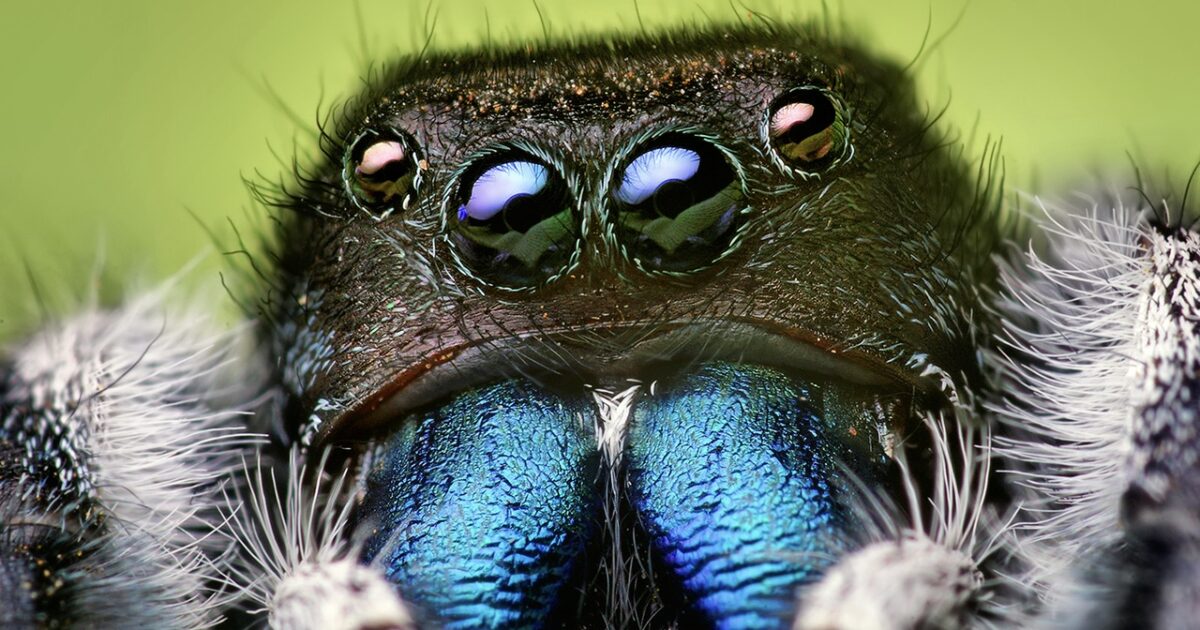 Intelligent Design
Intelligent Design
 Neuroscience & Mind
Neuroscience & Mind
Spiders Are Smart; Be Glad They Are Small

Spiders, like octopuses, have eight legs. But they share something else as well — like octopuses, once we got around to studying them, they turned out to be much smarter than expected. What makes spiders even more unusual is that they are smart with very small brains:
“There is this general idea that probably spiders are too small, that you need some kind of a critical mass of brain tissue to be able to perform complex behaviors,” says arachnologist and evolutionary biologist Dimitar Dimitrov of the University Museum of Bergen in Norway. “But I think spiders are one case where this general idea is challenged. Some small things are actually capable of doing very complex stuff.”
Behaviors that can be described as “cognitive,” as opposed to automatic responses, could be fairly common among spiders, says Dimitrov, coauthor of a study on spider diversity published in the 2021 Annual Review of Entomology. From orb weavers that adjust the way they build their webs based on the type of prey they are catching to ghost spiders that can learn to associate a reward with the smell of vanilla, there’s more going on in spider brains than they commonly get credit for.
BETSY MASON, “SPIDERS ARE MUCH SMARTER THAN YOU THINK” AT KNOWABLE MAGAZINE (OCTOBER 28, 2021)
There are some other life forms where the idea that brain size is a guide to intelligence is challenged. For example, lemurs, with brains 1/200 the size of chimpanzee brains, can pass the same IQ test.
Very Clever Hunting Behavior
But, as Mason goes on to report, jumping spiders, for example, can show very clever hunting behavior. One group of jumping spiders, Portia, lures female spiders of another species (Eurytattus) to their deaths by mimicking the way a courting male spider shakes her nest and then attacking. They also attack web-building spiders by mimicking the tug on the web of a trapped insect, adjusting its tug to the size of the spider it plans to devour. More remarkably,
If these strategies don’t work on a particular web spider, another of Portia’s tricks is to shake the whole web so it moves as if a gust of wind had hit it. This acts as a smokescreen for the vibration Portia makes as it crawls into the target spider’s web. In laboratory experiments, Jackson found that Portia will try different plucking methods, speeds and patterns until it finds just the right combination to fool each individual web spider it hunts — essentially learning on the job.
BETSY MASON, “SPIDERS ARE MUCH SMARTER THAN YOU THINK” AT KNOWABLE MAGAZINE (OCTOBER 28, 2021)
Portia spiders have large brains — relative to other spiders — but that probably isn’t the whole answer to how they develop so many clever strategies. Organization of the brain is likely a factor too.
Another recent discovery is that the bridge spider, Larinioides sclopetarius, turns its web into a giant ear, to hear across great distances:
The bridge spider uses its web as an engineered “external ear” up to 10,000 times the size of its body, according to a preprint study posted to bioRxiv on October 18. The discovery, which has not yet been peer reviewed, challenges many assumptions that scientists have held for years about how spiders and potentially other arthropods navigate and interact with the world around them.
“Evolutionarily speaking, spiders are just weird animals,” Jessica Petko, a Pennsylvania State University York biologist who didn’t work on the new study, writes in an email to The Scientist. “While it has been long known that spiders sense sound vibration with sensory hairs on their legs, this paper is the first to show that orb weaving spiders can amplify this sound by building specialized web structures.”
DAN ROBITZSKI, “SPIDER USES ITS WEB LIKE A GIANT ENGINEERED EAR” AT THE SCIENTIST, (OCTOBER 29, 2021). THE PAPER IS OPEN ACCESS.
Some spiders have also mastered the art of hunting in packs.
Read the rest at Mind Matters News, published by Discovery Institute’s Bradley Center for Natural and Artificial Intelligence.
